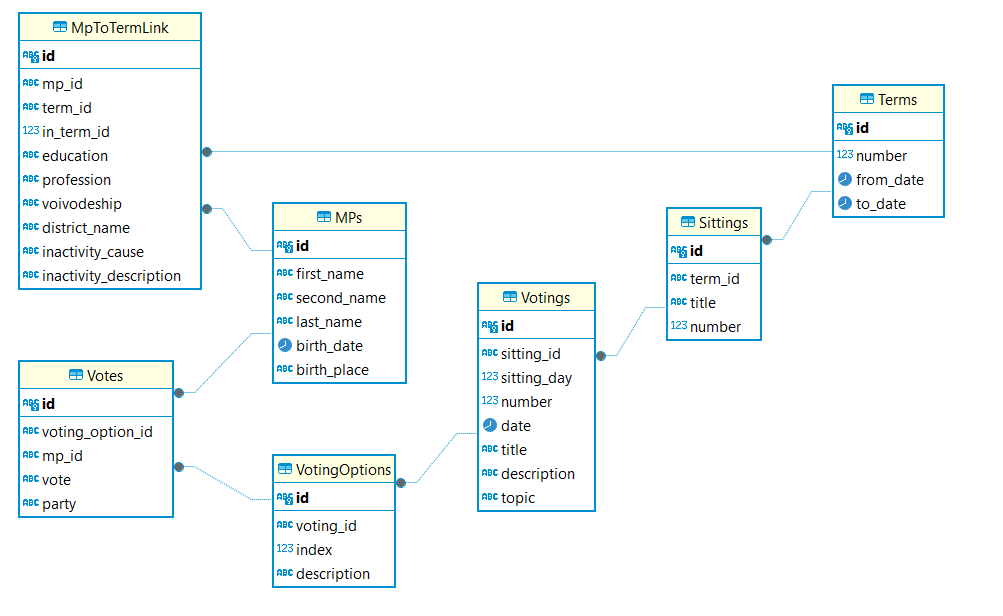The Sejm API facilitates access to comprehensive details about the terms, sittings, votings, votes, and MPs of the Polish Sejm. However, it presents several challenges:
- Absence of primary and foreign keys.
- API documentation does not specify nullable constraints.
- Inconsistent handling of votings that involve single or multiple voting options.
- MPs are defined per term rather than being treated as continuous entities across different terms.
These limitations can hinder efficient data analysis as the API's response times are slow and it necessitates a high volume of requests, which is time-consuming.
To address these issues, the following solutions have been implemented:
- Creation of a database that includes tables with natural keys, utilizing SHA-256 for hashing and enforced key constraints.
- Implementation of API response schema validation alongside stringent null constraints within the database.
- Normalization of votings to accommodate single-option scenarios uniformly.
- Refinement of MP entries into a global entity spanning multiple terms.
Furthermore, maintaining a local copy of the data ensures rapid access to the entire dataset, significantly enhancing analysis capabilities.
The Sejm API models MPs on a term-by-term basis rather than maintaining a continuous, global MP entity. In contrast, the enhanced data model treats each MP as a global object. This difference introduces potential duplication in our data due to various inconsistencies originating from the Sejm API, including:
- Data entry errors, such as typos or inconsistent naming of birthplaces.
- Changes in an MP's last name, commonly due to marriage.
- Previously missing fields that have been added later and are integral to our primary key, like birthplace.
To ensure accurate and reliable analysis, it's crucial to deduplicate these entries.
- Built with 🐍Python and Postgres on 🐋Docker.
- Normalized data model with primary keys, foreign keys, and not null constrains.
- Fast and realiable processing thanks to the custom client for Sejm API.
- Able to resume work from a given term, sitting, and voting.
- Python 3.12
- Poetry (optional)
- Docker Desktop (not required if you have Postgres database ready)
https://github.com/LuxF3rre/sejm_scrapercd sejm_scraperpip install -r requirements.txtFor development requirements as well:
pip install -r requirements-dev.txtIf you have poetry:
poetry shell
poetry installFor development requirements as well:
poetry shell
poetry install --with devIf you don't have Postgres database ready run:
docker-compose up -dIf you have Postgres database ready set the connection through these environmental variables:
SEJM_SCRAPER_HOSTSEJM_SCRAPER_PORTSEJM_SCRAPER_DATABASESEJM_SCRAPER_USERSEJM_SCRAPER_PASSWORD
python ./src/sejm_scraper/main.py prepare-databaseIf you have poetry:
sejm-scraper prepare-databasepython ./src/sejm_scraper/main.py scrapeIf you have poetry:
sejm-scraper scrapepython ./src/sejm_scraper/main.py scrape --from-point term[,sitting[,voting]]If you have poetry:
sejm-scraper scrape --from-point term[,sitting[,voting]]python ./src/sejm_scraper/main.py --helpIf you have poetry:
sejm-scraper --helpThis project's scope is constrained by the data availability from the Sejm API:
- Absence of MP data for term 2.
- Limited to only term and MP data for terms 3 through 7 and votes data from term 8 onwards.
- Absence of exact dates of becoming active or inactive for MPs as well as changing the party.
To address the first two gaps, future development efforts should aim to source the missing data directly from the Sejm's official website. The data is not exposed directly on the webpage, but can be obtained by using the following URL pattern:
https://sejm.gov.pl/sejm10.nsf/agent.xsp?symbol=glosowania&NrKadencji={term_number}&NrPosiedzenia={sitting_number}&NrGlosowania={voting_number}
For example:
https://sejm.gov.pl/sejm10.nsf/agent.xsp?symbol=glosowania&NrKadencji=3&NrPosiedzenia=6&NrGlosowania=2
Sejm API:
Similar projects:
Pull requests are welcome. For major changes, please open an issue first to discuss what you would like to change.
MIT License





